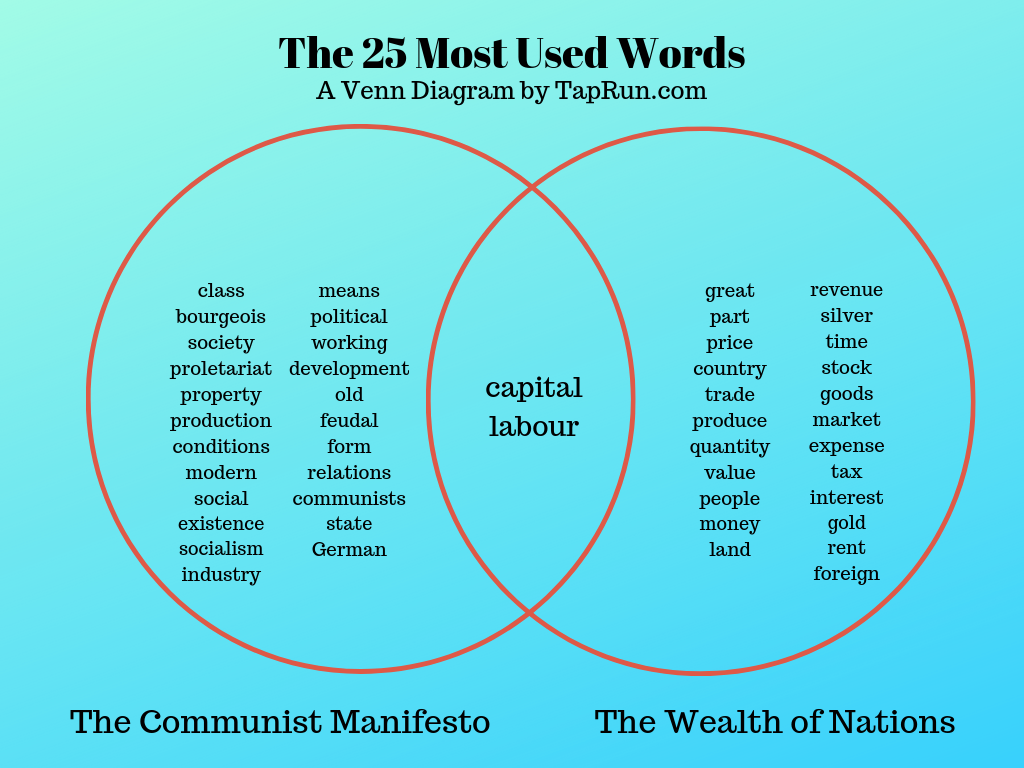A Venn Diagram of Communist and Capitalist Writing
Thursday, January 17, 2019
Relatively few people have taken the time to read both Karl Marx's The Communist Manifesto and Adam Smith's The Wealth of Nations. This isn't surprising. Neither is particularly light reading, and each targets a very different audience.
Fortunately, as I have already demonstrated, it is perfectly acceptable to evaluate books without actually reading them. I recently performed a computerized analysis of the two works cited above and plotted the most common words in each (stop words excepted). Although my examination may appear unusual, the study of texts by word selection has been a focus of scholars for nearly a millennium.

It is important to note that Karl Marx had a distinct advantage over Adam Smith: The Communist Manifesto was published nearly three quarters of a century after The Wealth of Nations' first printing. As a result, Marx had ample time to consider Smith's theses and discuss them with experts in the field. Given The Wealth of Nations' enduring legacy in capitalist economics, one might expect that Marx's famous attack on capitalism would make its case by focusing on the points and concepts central to Smith's arguments. However, as is clear from my Venn diagram, he didn't appear to do that. There is little in the way of overlap in vocabulary between the two works.
Does this lack of commonality reveal a critical mistake by Marx as he promoted his system of governance that led to the impoverishment, starvation, and premature deaths of many tens of millions of people?
Hardly!
As suggested in my article The Differentiation Danger Zones, vendors of products, services, and even ideologies should exercise great care when describing their offerings. Using another party's vocabulary can imply the existence of similarities between the respective offerings. As a result, an overlap of vocabulary can serve as an important signal with respect to an offering's positioning.
Contrary to popular opinion, Adam Smith was not, in fact, unconcerned with the well-being of Marx's proletariat, as evidenced by the following excerpt:
It is the great multiplication of the productions of all the different arts, in consequence of the division of labour, which occasions, in a well-governed society, that universal opulence which extends itself to the lowest ranks of the people.
Nevertheless, at its heart, The Wealth of Nations is an examination of methods for maximizing production, whereas The Communist Manifesto is most certainly not. Despite putting forth communism as an economic system, Marx knew better than to suggest that his ideology could beat capitalism in terms of raw output. As a result, Marx wisely chose to focus his arguments elsewhere.
One cannot deny that communism had a fairly long run and significant uptake worldwide, especially given its inherent flaws. Part of this success may have been due to Marx's adherence to an important rule: marketers are under no obligation to allow competitors to determine the language, framing, and conceptualization that they must use.
In the world of business, competing against another's unmatched strengths will almost assuredly necessitate the use of discounting in order to earn significant sales. Not only does competing on price violate the commandments laid out in our pricing manifesto, but it also unnecessarily reduces the likelihood and potential strength of customer interest as well.